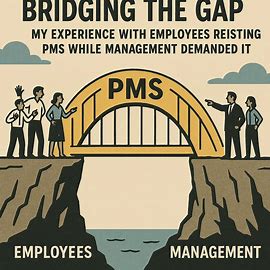BRIDGING THE GAP: MY EXPERIENCE WITH EMPLOYEES RESISTING PMS WHILE MANAGEMENT DEMANDING IT
Tug of war between employer and employees over Performance Management System (PMS )
Savita Morale
10/5/20251 min read


As a strategic HR consultant, I’ve witnessed first-hand one of the most common challenges in organizations: the friction that arises when management insists on rolling out a Performance Management System (PMS), but employees show little enthusiasm—if not outright resistance.
What I Observed from Employees
In multiple assignments, I noticed employees often viewed PMS as:
1.Perceived Policing: Many told me, “This feels like surveillance, not support.” They feared it was more about control than development.
2. Lack of Trust: Where the culture wasn’t transparent, employees doubted fairness and assumed PMS would be misused.
3.Cumbersome Processes: Long forms, ratings, and rigid checkpoints drained energy instead of inspiring improvement.
4. Fear of Bias: A recurring theme was skepticism—employees worried ratings would reflect favoritism or office politics.
5.No Personal Benefit: Unless they could see tangible growth, learning, or rewards, PMS felt like unnecessary extra work.
Why Management Wanted PMS
On the other side, I’ve sat with CXOs and senior leaders who were clear about why they wanted PMS:
1.Strategic Alignment: To ensure every role pushed the company toward its vision.Companies who are at a stage where they can scale the business find it necessary to realign their manpower.
2.Measurable Accountability: To generate data for promotions, increments, and succession planning.
3.Productivity & Skill Gap Analysis: Leaders valued PMS for identifying training needs and performance gaps.
4.Documentation & Compliance: Especially in disputes, having formal performance records became critical.
5. Competitive Advantage and profitability : A structured PMS promised efficiency and innovation—if implemented well can affect top line and bottom line.
Connect with LABDHI HR today itself to bridge the gap.
LABDHI HR
LABDHI HR STRATEGIES AND SERVICES
consultant@labdhihr.com
+91 8424815548
© 2024. All rights reserved.
Registered Office Address:
We Work, Oberoi Commerce II , Goregaon East, Mumbai,Maharashtra,India-400063
